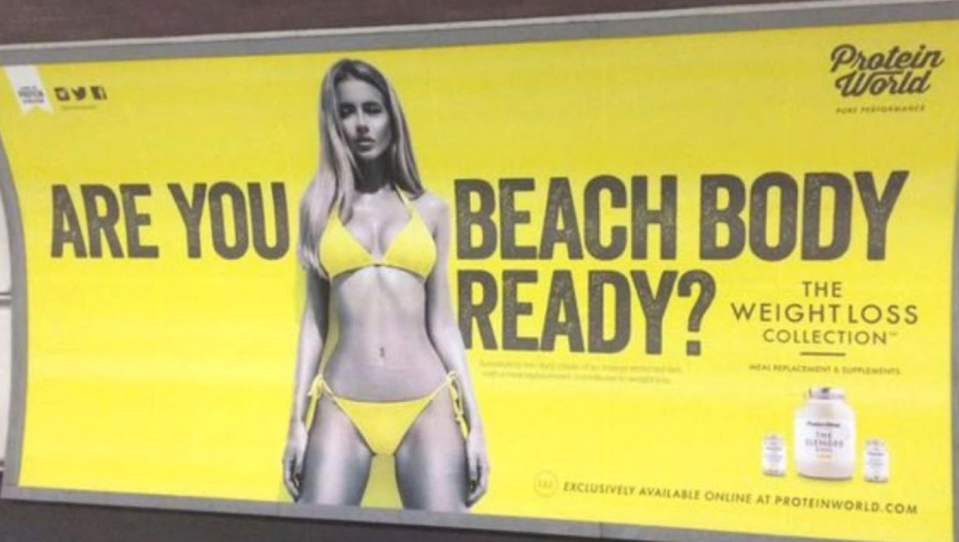Adverts that make controversial claims about women's bodies
A China-based coconut milk manufacturer has been criticised for a series of adverts which claim the drink will make women’s breasts larger.
The billboard adverts, circulated by Coconut Palm, features a woman with large breasts in a black bra.
They are accompanied by slogans such as “drinking more coconut milk every day can make [your] breasts fuller” and “drink one can every day, [your] curves will excite people, whiter and more plump”.

The company has already made the claim previously. In 2017, a TV advert showed women wearing low-cut, cleavage-baring tops on a beach.
Users on Chinese social media platform Weibo expressed their shock. One user wrote: “When I first saw the advert, I thought some netizen had just Photoshopped it. It’s only now that I realised it was actually true and not someone joking around.”
Another, who comes from Hainan in southern China, where the drink is produced, wrote: “Every time someone praised the drink, I would feel quite proud. But I really don’t want to mention this advert.”
The advert is now being investigated by the Industrial and Commercial Bureau of Longhua district in Haikou, a city in the Hainan province. The company has also launched an internal investigation into the advert, according to the The Beijing Times.
This isn’t the first brand to make controversial claims about its product’s ability to change a woman’s body. From the infamous Protein World claims to a recent vaginal tightening product, here are some others:
Vivo Clinic vaginal tightening
This month, a website for a non-surgical vaginal tightening procedure – called FemiWand – was banned by the Advertising Standards Authority (ASA). The advert, which depicted a scene from ‘The Real Housewives of Cheshire’, showed a woman having a vaginal contraction ball inserted while her friends stood by drinking prosecco.
The ASA chose to ban the advert following a formal investigation, concluding the advert was “irresponsible” and had no medical backing.
MYA breast enlargement adverts
An advertisement by cosmetic surgery company MYA, which aired during the UK’s Love Island, was banned by the Advertising Standards Authority in 2018.
![The MYA breast enlargement adverts were circulated during Love Island. [Photo: MYA]](https://s.yimg.com/ny/api/res/1.2/vYk8j1XVq6T48XuAJ0al_w--/YXBwaWQ9aGlnaGxhbmRlcjt3PTk2MDtoPTY1NA--/https://media.zenfs.com/en/homerun/feed_manager_auto_publish_494/b7d4c00a9ddb2a5fec53d9133c821960)
The ASA investigated the advert after receiving dozens of complaints, many accusing the company of exploiting young women’s insecurities about their bodies, trivialising breast enhancement surgery and portraying it as aspirational.
The report concluded the adverts were “irresponsible and harmful“.
“We considered that the ad went beyond presenting the lifestyle of women who had breast enlargement in a positive light and implied that the women were only able to enjoy the aspirational lifestyle shown, and to be happy with their bodies, because they had undergone that surgery,” the watchdog concluded.
Protein World’s “Beach Body Ready” adverts
Meal replacement brand Protein World became the subject of fury on social media for its “Are You Beach Body Ready?” billboards, which featured on the London Underground.

After a number of complaints, and Tube users actively defacing the advert, the ASA banned the advert on the grounds it made misleading nutrition and health claims.
Natural Cycles contraceptive app
An advert for smartphone-based contraceptive Natural Cycles was banned after three complaints were made regarding a Facebook advert for the app. The tool, which is used by more than 100,000 women across the UK, has been marketed as a contraceptive since February 2017.
The ASA banned the Facebook advert for the app, which described it as “highly accurate” and as a “clinically tested alternative to birth control methods“.
In the ruling, it concluded the contraception was not as reliable as contraceptives such as implants and coils, and therefore should not be marketed in this way.
The ASA told Swedish-based Natural Cycles they should be careful “not to exaggerate the efficacy of the app in preventing pregnancies”.
Got a story tip? Send it to lifestyle.tips@verizonmedia.com
Want more lifestyle and celebrity news? Follow Yahoo Lifestyle on Facebook, Twitter and Instagram.
Or sign up to our daily newsletter here.

 Yahoo Lifestyle
Yahoo Lifestyle 

